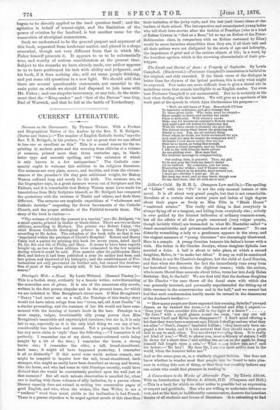Penelope's Web : a Novel. By Louis Witbred. (Samuel Tinsley.)—
This is a foolish story, evidently by a female writer, notwithstanding the masculine nom de plume. It is one of the numerous silly novels, written in the first person singular and in the present tense, for which we are indebted to Miss Broughton's clever ones. If Miss Broughton's "Nancy " had never sat on a wall, the Penelope of this trashy story would not have taken refuge from her " cross, sad, old Aunt Cecilia " in a similar proceeding, and the romance of her life would not have com- menced with the hearing of horse's hoofs in the lane. Penelope is a more empty, vulgar, irreclaimably silly young person than Miss Broughton's unamiable and unprincipled heroines; but she is, it is only fair to say, especially as it is the only kind thing we can say of her, considerably less lawless and sensual. Not a paragraph in the book has any more claim to style ' than the following :—" I remember it all perfectly. I remember one of my short, russet-coloured curls being caught by a bit of the tree ; I remember the horse, a strong brown one ; I remember the rider, a tall, broad-shouldered, dark man ; it might all have happened yesterday, I remember it all so distinctly." If this novel were worth serious remark, one might be tempted to inquire how the tall, broad-shouldered, dark stranger, who might as easily have been described as strong and brown, like his horse, and who had come to visit Penelope secretly, could have divined that she would be conveniently perched upon the wall just at that moment ? But all such minute observation is uncalled for, when one is dealing with three volumes of silly imitation, by a person whose literary capacity does not extend to writing two consecutive pages of good English, and who, when she wishes, like Sam Weller, to use a " tenderer " word than usual, yields to the inclination in bad French. There is a graver objection to be urged against novels of this class than their imitation of the jerky style, and the fast (and loose) ideas of the I leaders of their school. The introspective and emancipated youngladies who tell their love-stories after the fashion of Penelope (who is a kind of Esther Craven in "Red as a Rose,"let us say an Esther of the Peter- Robinsonian class, in comparison with an Esther costumed by Elise) would be more harmless absurdities than they are, if all their talk and all their actions were not disfigured by the scorn of age and infirmity, the impatience of grief and of the serious objects of life; in a word, by the heartless egotism which is the crowning characteristic of their pro- totypes.


































 Previous page
Previous page